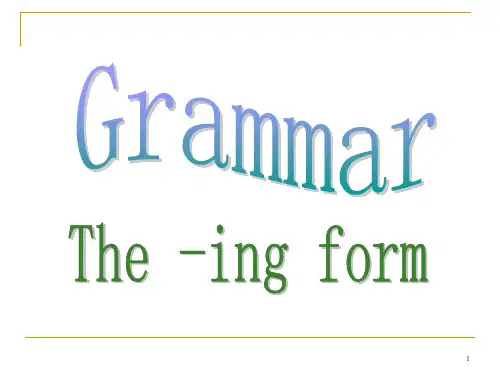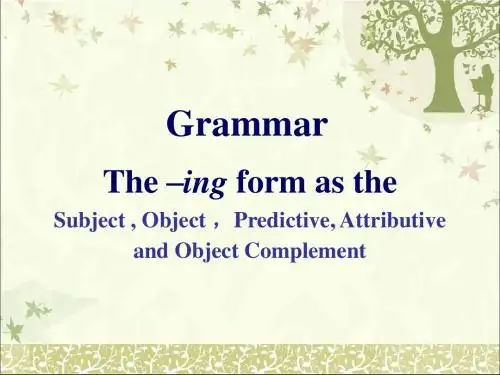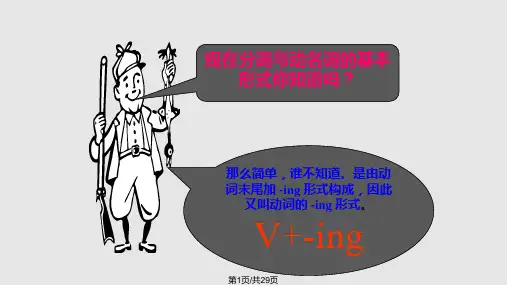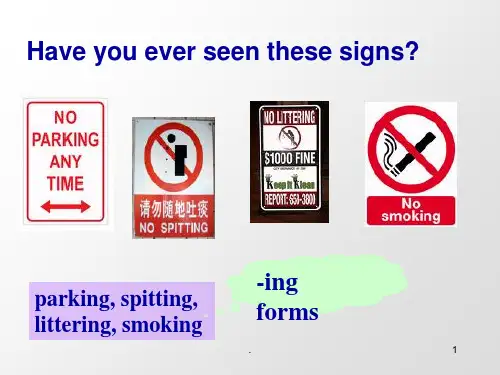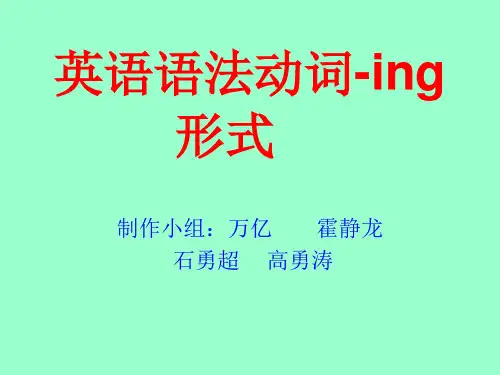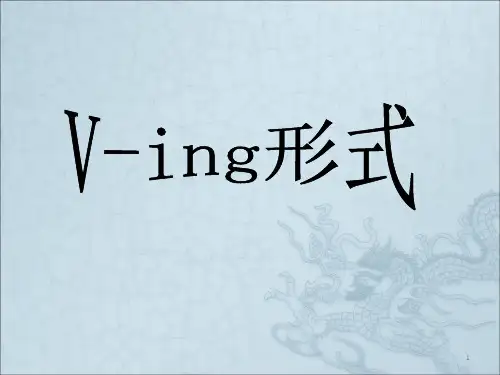- 1、下载文档前请自行甄别文档内容的完整性,平台不提供额外的编辑、内容补充、找答案等附加服务。
- 2、"仅部分预览"的文档,不可在线预览部分如存在完整性等问题,可反馈申请退款(可完整预览的文档不适用该条件!)。
- 3、如文档侵犯您的权益,请联系客服反馈,我们会尽快为您处理(人工客服工作时间:9:00-18:30)。
二、动名词用作宾语 动名词作宾语有两种情况。 1. 只能后接-ing作宾语的动词, 常见的有 avoid, consider, enjoy, keep, finish, suggest, dislike, delay, escape, cannot help, imagine, mind, miss, practise, cannot stand, excuse, fancy, give up, put off, risk, insist on, look forward, feel like等。 e.g.
3. 在there be no...结构中作主语, 这种结构 的意思相当于“It is impossible to do… ”。
• There is no sense in doing 做……没有道理 • There is/was no use doing 做……无意义 • There is/was nothing worse than doing
The –ing form 构成: 1.一般情况 rain------raining 2.以e结尾的动词 hope-----hoping 3.重读闭音节的动词
stop-----stopping 4.以ie结尾的动词
die-----dying lie---lying tie----tying
归纳总结:
• In the dream Peter saw himself raunn after by a fierce wolf, and he woke suddenly.
• The wild flowers looked like a soft orange blanket covering the desert.
2. 既可接-ing和to do作宾语的动词, 常见的有:
begin, start, continue, like, love, prefer, by, mean, forget,remember, hate等。 A. 在 like, love, hate, prefer等动词之后, 用-ing或不定式意义上没有什么不同, 只是侧重 点有些不同, ing表示泛指的动作, to do表示具体的一次性动作。 B. 在 begin/start, continue之后, 用动名词和 不定式, 意义没有什么不同, 尤其是当主语是 人的时候。
Grammar
The –ing form as the
Subject , Object ,Predictive, Attributive and Object Complement
Q: 什么时候用非谓语动词?
在英语中,一个独立句子里只能
有一个主谓结构,如果出现多
个动词: • 加连词(and / but / so…) • 放入从句 • 用非谓语动词
• It is/was worth/worthwhile doing • 做……是值得的
• There be no doing • 无法…… , 不允许……
和夏洛克争辩是没有什么用的。 It is useless trying to argue with Shylock. 这事值得去做。 It’s worth making the effort. 若要人不知,除非己莫为。 There is no hiding of evil but not to do it. 这种事开不得玩笑。
D. 意义各不相同 try to do (设法) mean to do (打算, 有意要做) try doing (试试) mean doing (意思是, 意味着) be used to doing 习惯于做某事 be used to do 被用来做某事 can’t help doing 禁不住做某事 can't help to do 不能帮助做某事
Q: 非谓语动词有哪些?
非 不定式 to + v. 谓 语 动词的v-ing 动 词 过去分词 v-ed
4
Have you ever seen these signs?
parking, spitting, littering, smoking
-ing forms
指出-ing形式在下面句中的成分。
Q: 什么是非谓语动词?
找出下列句子中的谓谓语语 及非非谓谓语语
• There have been several new events added to the program for the 2008 Beijing Olympic Games.
• Whenever he was asked why he was late for class, he would answer carelessly, always offering the same excuse.
注意: There is no need to do sth 没必要做某事, 在此句式中to do 不可换为doing. There is no need to tell her.
提示: 当动名词用作主语时, 其逻辑主语由 形容词性物主代词和名词所有格构成。
1)My sister’s being ill made me worried. 2)Your being right doesn’t necessarily mean my being wrong.
1. 动词-ing形式的构成: 是在动词末尾加-ing 形式构成, 因此又叫动词的 -ing 形式。 如: do-doing, be-being, ask-asking, etc. 否定形式: not+ -ing 构成 2. 动词-ing形式不能单独作谓语, 没有人称和 数的变化, 但可以有自己的宾语和状语, 还有 时态和语态的变化。 3. 动词-ing形式由动词加-ing变化而成, 它同时具有名词和动词的特征, 在句中可以 作主语、宾语等。
Ing 时 态 和 语 态
类别
及物 动 词
形式主Βιβλιοθήκη 被 动一般式 doing 重点 being done
完成式 having done
having been done
注:否定式在其一般式和完成式前面加not
一、动词-ing形式作主语 1. 表示经常的、习惯性的动作或状态, 谓语动词通常用单数。如:
• Finding ways to grow more rice has been his life goal. 主语
• He enjoys listening to violin music. 宾语 • China is a developing country. 定语
• The music is exciting. 表语 宾语补足语 • We heard her singing in her room. • Being ill, she went back home. 状语
没有比……更糟的 • There is/was no point doing 做……无意义
Try to tell the meaning of each sentence.
1)There is no hiding of evil but not to do it. 若要人不知, 除非己莫为。 2)There is no joking about such matter. 这种事开不得玩笑。 3)There was no knowing when he would leave. 无法知道他什么时候离开。
◆动词-ing是___动__词_非__谓__语__形__式______中的一种, 单独使用时,能在句中做除__谓__语__之外的任 何其他句子成分。如:主语、宾语、表语、定 语、状语、宾补等。
◆在语态上,动词-ing表示_主__动__(主动/被动) 的动作。在时间上,动词-ing一般表示正__在__进__行 (正在进行/已经完成)的动作。
1)Walking is a good form of exercise
for both young and old. 2)Watching news on TV has become
a routine for me. 3)Going to Hangzhou by train takes
about 16 hours. 4)Asking a woman’s age is impolite
in our country.
2. -ing形式作主语时常后置, 此时须用it 作形式主语, 用形容词或名词作表语。 常见的名词或名词短语有: no use,
no good, fun, hard work, a hard / difficult job, a waste of time 等; 形容词有: dangerous, worthwhile, useless等。
• 归纳:常用-ing形式作主语的句型有:
• It +be +a waste of time doing • 做……是浪费时间的
• It is/was no good/use doing • 做……是没益/用处的
• It is/was hardly/scarcely worth doing • 做……不值得
C. 在动词forget, remember, regret之后, 用 动名词与不定式意义不同。 -ing 表示动作已经发生, -to do 表示动作还没发生; I remember posting the letter. I’ll remember to post the letter. I shall never forget seeing the famous writer. Don’t forget to write to your mother. I regret missing the report. I regret to say I can’t take your advice.
